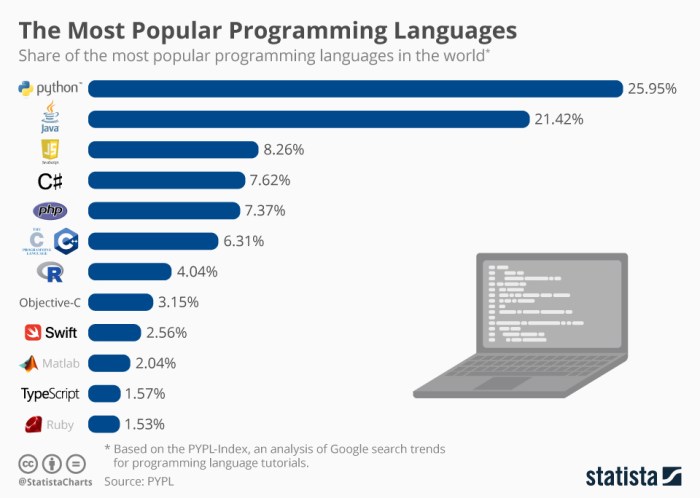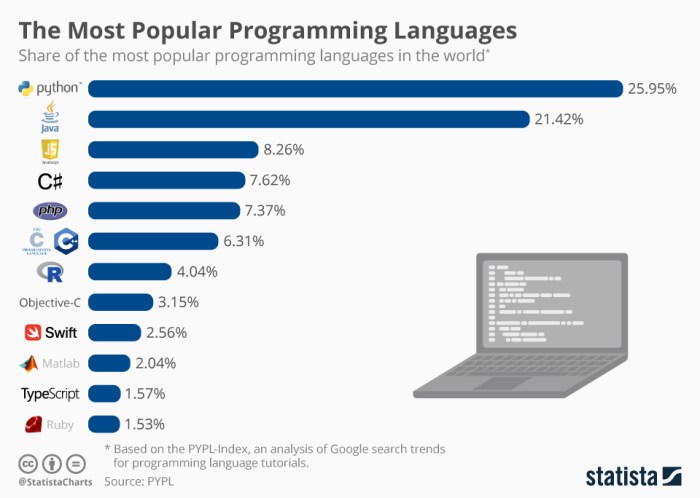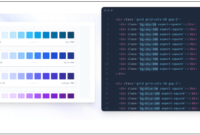Why PHP continues to be a popular but divisive programming language is a question that sparks heated debate among developers. While PHP has powered some of the internet’s most prominent websites, its history is also marked by criticisms regarding security, performance, and code quality.
This begs the question: is PHP a relic of the past, or does it still hold a place in the future of web development?
The answer, like many things in the tech world, is complex. PHP’s enduring popularity stems from its ease of use, a vast ecosystem of libraries and frameworks, and widespread adoption. However, these strengths are often overshadowed by concerns about its perceived limitations.
To understand the current state of PHP, we need to examine its history, its evolution, and its place in the ever-changing landscape of web development.
PHP’s Enduring Popularity

PHP’s continued relevance in the web development landscape is a testament to its enduring popularity. Despite the emergence of newer languages and frameworks, PHP remains a mainstay for building dynamic websites and web applications. Understanding the historical context of PHP’s rise and its continued success is crucial for appreciating its enduring impact on the web development ecosystem.
Historical Context and Initial Advantages
PHP’s journey began in 1994 when Rasmus Lerdorf created a set of Common Gateway Interface (CGI) binaries called “Personal Home Page Tools.” These tools helped him manage his personal website. The initial version was rudimentary but quickly gained popularity among web developers due to its simplicity and ease of use.
In 1995, Lerdorf released the source code for PHP, making it open-source and contributing to its widespread adoption. PHP’s initial advantages included its ease of learning and its ability to embed code within HTML. This simplified the development process, making it accessible to a wider range of developers, particularly those with limited programming experience.
PHP’s ability to seamlessly integrate with HTML, coupled with its support for various databases, made it a powerful tool for building dynamic websites.
The Debate Surrounding PHP
PHP’s enduring popularity hasn’t come without its share of controversy. While many developers swear by its simplicity and ease of use, others criticize its perceived shortcomings, leading to a heated debate about its place in modern web development. This debate is fueled by a mix of technical considerations, historical context, and evolving trends in the software development landscape.
Common Criticisms of PHP
The criticisms leveled at PHP often revolve around concerns about security, performance, and code quality. While these concerns are not necessarily unique to PHP, they have been amplified in the context of its widespread adoption and its perceived lack of strictness in certain areas.
- Security Vulnerabilities:PHP’s history is marked by a number of high-profile security vulnerabilities, including SQL injection flaws and cross-site scripting (XSS) vulnerabilities. These vulnerabilities can expose websites to malicious attacks, leading to data breaches and other security risks. While PHP has improved its security features over the years, these past vulnerabilities have contributed to a perception of PHP as being less secure than other languages.
- Performance Concerns:Some argue that PHP applications can be slower than those written in languages like Python or Go. This perception stems from PHP’s interpreted nature and its reliance on a slower execution model. However, it’s important to note that PHP’s performance can be optimized through various techniques, including caching and code optimization.
Moreover, the performance difference between PHP and other languages can vary significantly depending on the specific application and its implementation.
- Code Quality and Maintainability:PHP’s flexible syntax, while considered a benefit by some, has also been criticized for contributing to code that can be difficult to read, maintain, and debug. This is especially true in large, complex projects where multiple developers may be working on the same codebase.
Examine how vay teledriving service launches vegas can boost performance in your area.
However, the adoption of coding standards and frameworks like Laravel and Symfony has helped to improve code quality and maintainability in PHP projects.
Arguments for and Against Using PHP in Modern Web Development, Why php continues to be a popular but divisive programming language
The debate about PHP’s relevance in modern web development is often framed as a battle between tradition and innovation. While PHP has been a cornerstone of web development for decades, its critics argue that newer languages offer better features and a more modern approach.
- Arguments for PHP:
- Large Community and Ecosystem:PHP boasts a vast and active community, offering extensive documentation, tutorials, and support resources. This makes it easier for developers to learn and use PHP, and to find solutions to common problems. Furthermore, the PHP ecosystem is rich in frameworks, libraries, and tools that can streamline development and enhance functionality.
- Ease of Learning and Use:PHP’s syntax is relatively straightforward and easy to learn, making it an attractive option for beginners and experienced developers alike. Its focus on web development makes it well-suited for building dynamic websites and web applications.
- Cost-Effectiveness:PHP is an open-source language, which means it’s free to use and distribute. This makes it a cost-effective option for businesses of all sizes, especially those with limited budgets.
- Arguments Against PHP:
- Perceived Lack of Modernity:PHP has been criticized for its perceived lack of modern features, such as strong typing and built-in support for asynchronous programming. However, recent versions of PHP have introduced features like type hinting and generators, addressing some of these concerns.
- Security Concerns:As mentioned earlier, PHP’s history of security vulnerabilities has led some developers to question its suitability for modern web applications, where security is paramount. However, PHP’s security features have been significantly enhanced in recent years, and the language continues to evolve to address emerging security threats.
- Limited Scalability:Some argue that PHP is not as scalable as other languages, particularly for large and complex applications. However, with proper architecture and optimization, PHP can be used to build scalable applications, as demonstrated by the success of many high-traffic websites built with PHP.
Comparison with Other Popular Programming Languages
PHP is often compared to other popular programming languages, such as Python, JavaScript, and Ruby. These languages offer different strengths and weaknesses, making the choice of language dependent on the specific project requirements and developer preferences.
- Python:Python is known for its readability, versatility, and extensive libraries for data science, machine learning, and web development. It’s often favored for its clean syntax and its emphasis on code clarity. However, Python’s execution speed can be slower than PHP’s, especially for computationally intensive tasks.
- JavaScript:JavaScript is the dominant language for front-end web development and is also gaining popularity for back-end development through Node.js. Its event-driven, asynchronous nature makes it well-suited for building interactive and real-time applications. However, JavaScript’s dynamic typing and complex syntax can pose challenges for some developers.
- Ruby:Ruby is known for its elegant syntax, its emphasis on developer productivity, and its popular web framework, Ruby on Rails. It’s often favored for its ease of use and its focus on convention over configuration. However, Ruby’s performance can be slower than PHP’s, and its community is smaller than PHP’s.
PHP’s Evolution and Modernization: Why Php Continues To Be A Popular But Divisive Programming Language
PHP, once known for its simplicity and ease of use, has undergone a significant transformation, evolving to address criticisms and meet the demands of modern web development. This evolution has been driven by a commitment to introduce powerful features, enhance performance, and adapt to the ever-changing landscape of web technologies.
Object-Oriented Programming in PHP
The introduction of object-oriented programming (OOP) in PHP 5 marked a pivotal moment in its evolution. OOP principles, such as encapsulation, inheritance, and polymorphism, provided developers with a structured and modular approach to code organization. This shift addressed a long-standing criticism of PHP, its lack of a robust framework for building complex applications.
“PHP’s OOP features enable developers to write cleaner, more maintainable, and reusable code, making it suitable for large-scale projects.”
- Encapsulation: Encapsulation protects data by restricting direct access, ensuring data integrity and reducing the risk of errors.
- Inheritance: Inheritance allows developers to create new classes that inherit properties and methods from existing classes, promoting code reuse and reducing redundancy.
- Polymorphism: Polymorphism enables objects of different classes to be treated as objects of a common type, facilitating flexible and extensible code.
Frameworks and Libraries
The rise of frameworks like Laravel, Symfony, and Zend has revolutionized PHP development. These frameworks provide a standardized structure, pre-built components, and best practices, simplifying the development process and reducing the need for repetitive coding. They also offer features like routing, database interaction, and security, significantly enhancing the functionality and security of PHP applications.
“Frameworks provide a foundation for building complex web applications, offering a structured approach to development and promoting code reusability.”
- Laravel: Laravel is known for its elegant syntax, robust features, and extensive documentation. It provides a powerful and expressive way to build web applications.
- Symfony: Symfony is a highly flexible and modular framework that allows developers to choose and configure components as needed.
It offers a wide range of features and is suitable for large-scale projects.
- Zend: Zend Framework is a component-based framework that focuses on enterprise-level development. It offers a wide range of components for building robust and scalable applications.
Performance Enhancements
PHP’s performance has significantly improved over the years. The introduction of features like the Zend Engine, Just-In-Time (JIT) compilation, and the Opcache extension have contributed to faster execution times and improved overall performance.
“PHP’s performance enhancements have made it a viable option for building high-performance web applications that can handle significant traffic.”
- Zend Engine: The Zend Engine is the core component of PHP, responsible for parsing and executing PHP code. It has undergone numerous optimizations over the years, resulting in significant performance gains.
- JIT Compilation: JIT compilation compiles PHP code to machine code at runtime, resulting in faster execution speeds.
- Opcache: The Opcache extension stores precompiled PHP code in memory, reducing the need for repeated compilation and improving performance.
PHP’s Role in the Future of Web Development
PHP’s enduring popularity, despite the rise of newer languages and frameworks, raises a crucial question: What does the future hold for this language? While PHP’s dominance may have waned, it remains a vital force in web development, particularly in established ecosystems.
To understand its future, we must analyze the current trends and their potential impact on PHP’s relevance.
The Impact of Emerging Technologies
The web development landscape is rapidly evolving, driven by advancements in technologies like artificial intelligence (AI), serverless computing, and the Internet of Things (IoT). These technologies demand languages and frameworks capable of handling complex data processing, real-time interactions, and distributed systems.
While PHP has traditionally excelled in handling server-side logic and database interactions, its ability to adapt to these new demands is a key factor in its future success.
PHP’s Adaptability and Evolution
PHP has a strong track record of adapting to changing trends. The language has undergone significant modernization in recent years, with the introduction of features like namespaces, traits, and improved type hinting, enhancing code organization and maintainability. The emergence of frameworks like Laravel and Symfony has further empowered developers, providing robust tools for building modern, scalable web applications.
PHP’s Continued Relevance
While PHP might not be the “hottest” language, its strengths remain relevant. It offers a gentle learning curve, a vast community, and a wealth of resources. This makes it an attractive option for developers, especially those working on projects with existing PHP codebases.
Furthermore, the large number of established PHP applications and websites ensures that the language will continue to be in demand for maintenance and development for years to come.
A Hypothetical Future Scenario
Given its strengths and weaknesses, a realistic future scenario for PHP could involve:
- Continued Use in Legacy Systems:PHP will likely remain the primary language for maintaining and evolving existing web applications. Its familiarity and established ecosystem make it a cost-effective choice for organizations with large PHP-based projects.
- Focus on Specific Niches:PHP might become more specialized, focusing on areas where its strengths shine, such as building content management systems (CMS), e-commerce platforms, and other application areas where its mature ecosystem and large community provide a distinct advantage.
- Integration with Emerging Technologies:PHP will likely integrate with newer technologies like AI and IoT, possibly through specialized libraries and frameworks. This integration would allow developers to leverage PHP’s strengths while benefiting from the capabilities of emerging technologies.





